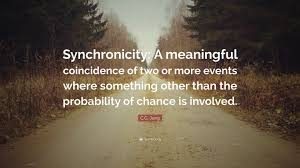Brownell
Synchronicities

 More "JMO" posts coming later. Since this blog is, really, supposed to be about my life in Aspen and since I had an eventful week, this post is part "week in review" and part about the synchronicities that happened throughout.
More "JMO" posts coming later. Since this blog is, really, supposed to be about my life in Aspen and since I had an eventful week, this post is part "week in review" and part about the synchronicities that happened throughout.
What is "synchronicity?"
It's a concept "invented" by Carl Jung suggests basically that things that appear to be unrelated actually are. Of course, it could be a self-fulfilling prophecy for those of us in the world who are looking for it. Sometimes it appears as doors opening from sources you didn't expect. Like tiny miracles out of nowhere. Which is actually more "serendipity" than "synchronicity," though I assert there's a relationship between the two concepts.

 Serendipities are "happy accidents." They also appear "out of nowthere" yet are also have a connection and/or benefit to you.
Serendipities are "happy accidents." They also appear "out of nowthere" yet are also have a connection and/or benefit to you.
I'm not sure of the Venn Diagram for these two concepts, but I'm sure there's an overlap. I'm just not sure if one is inside the other completely. Hmmm…
Anyway, this week was chock-full of them, partially (or mostly?) because I got out. A lot. Here's a recap:
Monday night I went to a lecture on "Environmentalism in the Trump Era" and met a new, fascinating friend who I saw again Thursday night.
Tuesday night I attended a talk by the Aspen Entrepreneurs by an "Undercover Angel," and re-ignitied a connection that continued on Wednesday and could open up an opportunity for my DrawSuccess business.
Wednesday night was a series of talks by the Aspen Center for Physics, talking about String Theory and Geometry in Physics where I met another new friend. The next day we went to the Aspen Institute to hear the curator tell the story of the art and history of my newly adopted home town.
That experience was a plethora of synchronicities. First of all, the Herbert Bayer artwork had so many synergies with the diagrams used in the Physics lecture. Mind-blowingly similar. Then when the curator talked about Bayer's emigration to the US during WWII I was struck with the similarities with a friend's play about Henri Matisse (who I helped with some edits for the second act of the play). So I helped facilitate that connection – which could lead to a performance of her play here in Aspen. (So far it's only been performed in London).
And to top it off, a possible door opened to bring alive my "50 Ways to Innovate" concept I'd been wanting to pursure with the Institute.
What will happen going forward? I won't speculate. I will say that I've been exploring the concept of "Positive Pessimism," and think it's time to write a blog about that.
Now… to return to the music tradition of my previous blogs…
JMO, Part 4: Education and College
 As I write these blog posts, I realize how many of these issues intertwine. The Wage Gap with Jobs with Immigration and, now, with Education. So forgive me if I repeat myself or make the same point more than once.
As I write these blog posts, I realize how many of these issues intertwine. The Wage Gap with Jobs with Immigration and, now, with Education. So forgive me if I repeat myself or make the same point more than once.
That is, if anyone's "listening" anyway.
Yesterday I talked about how I think it's the responsibility for the government to create an economy so that there are enough jobs to support the everyone willing and able to work. I also said that I belive it is (or should be) the responsibility of the education system to teach the subjects and skills that fit the needs of the marketplace. To educate people to fill – and keep – the jobs needed now and in the future.
Yet here's the problem: the education system isn't set up to prepare people to work and fill jobs. And it doesn't do nearly a good enough job to set up to create new jobs for the future.
In the corporate training world, skills like interviewing, getting along with others, teamwork, communication, conflict resolution and the like are considered "soft skills." The term alone implies weakness. And it CERTAINLY implies "optional" if not "unnecessary."
How sad is that?
Not as sad as when you consider how the education system barely even addresses these issues. They "teach" kids to sit still and be quiet for hours a day while they memorize useless facts that won't help them one iota in the "real world." Sorry to be so harsh – but this is my blog and I feel the need to make bold statements to focus attention on the issues.
I'm not going to address the issues of the current administration other than to say that I have zero optimism they'll improve things one iota; and, instead, I'm convinced that things will get worse if only because of all the other problems they'll cause that these issues I'm identifying will be ignored completely.
So what IS the solution?
As I said in the other post, people get and take jobs based on skills and specifics and they lose and leave jobs based on personalities and relationships.
Those "soft skills" I'm talking about. They're what makes people lose – or leave – jobs. They can't get along with others. They don't know how to contribute ideas. They have terrible communication skills – verbally and in writing. And, no, you don't learn this from a creative writing course. Although teaching and learning creativity is important, too. Just in a different way, for different reasons.
I also proposed that I am in agreement with free college – with some parameters. Colleges must not only teach these skills (which should also be taught in grade schools and middle and high schools), they also need to change the curriculum in order to meet the demands of the job market.
Some of you might argue, "then let's get rid of majors in Sixteenth Century Russian Poetry or Art History or some other major where there isn't exactly a booming job market."
Maybe. But I'm not sure that's the answer. I've read some articles suggesting that a Liberal Arts major or college might be the best at preparing students for a job or career. The question I'm proposing is that no matter what their degree, the students need to be EMPLOYABLE. Not just to get the job, but to keep the job. To do this, they need to learn:
- Creative thinking and problem-solving
- Decision-making
- Communication – written and verbal
- Conflict resolution
- Teamwork
- Efficiency and Productivity
- Accountability
- And I'm sure there are others to add to the list.
I also think people should graduate from high school with proficiency not just in math, but how to manage their finances. Not just in English, but in how to write a persuasive email. Not just in physical education, but in how to stay fit and prevent illness.
A Hermit Gets Out
 I'm taking a break in my political posts today to get back to a reflection on life in Aspen.
I'm taking a break in my political posts today to get back to a reflection on life in Aspen.
Last night I went to an event entitled "Environmentalism in the Trump Era."
Tonight I'm going to an Aspen Entrepreneurs event about philanthropic investing.
Wednesday night I'm going to try to attend two events – one is a discussion on Physics from the Aspen Center for Physics and the other is an author talking about his book about William Glasser.
Thursday there are also two other options.
All are free. All are within a 10 minute walk.
After reading and studying more on Archetypes, I conclude that I do, indeed, have many of the characteristics of a Hermit. Both bad and good. Or, as they say, both in the light and in the shadows. I googled it and found out more enlightening information… http://susannabarlow.com/on-archetypes/the-hermit-archetype/ . Look at the reference to forests and caves. (Remember my post about living in a cave?) Moving here certainly fits my archetype. Although interestingly it's easier to retreat in a large city than a small town. Which is both good and bad for my living here.
Like last night when I made a comment at the meeting on environmentalism. I felt compelled to say what everyone was thinking but not saying, and yet now I'm not so invisible. Especially here.
Is that good? Or bad?
JMO, Part 3: Jobs
 In a previous post I talked about how I used to be a Young Republican – before there was so much blatant corruption in the party. One of the big reasons was that I believed in supporting business in order to create jobs instead of paying people not to work.
In a previous post I talked about how I used to be a Young Republican – before there was so much blatant corruption in the party. One of the big reasons was that I believed in supporting business in order to create jobs instead of paying people not to work.
First, let me propopse something clearly. Something RADICAL.
I BELIEVE it should be the responsibility of the government to produce an economy so that there are enough jobs to support the everyone willing and able to work.
Pretty radical idea, right?
Radical, but logical.
Here's another one: I belive it is (or should be) the responsibility of the education system to teach the subjects and skills that fit the needs of the marketplace. To educate people to fill – and keep – the jobs needed now and in the future.
What do I mean about "and keep?" Let me be clear about one of my firmest beliefs: People get and take jobs based on skills and specifics. But they lose and leave jobs based on people and relationships. What does this mean?
Let me say it again. People get and take jobs based on skills and specifics. They get a job if they have the qualifications to do the job, and they take a job based on the salary and benefits and other specifics.
And they lose or leave jobs based on people and relationships.
Let's break it down. You get a job making widgets if you know how to make widgets. You take a job making widgets when an employer pays you a fair wage (and other benefits) to make those widgets. Want to make more money? Make better – or more widgets. Or make something else with your special skills and experience and education that produces more income than widgets. Economics 101.
But what about the second part? That people lose and leave jobs based on people and relationships. Let's break that down, too.
You might be great at making widgets. But what if you come in late, leave early or take a lot of breaks and don't make as many widgets per hour as what they're paying you to do? Or what if you're difficult to work with? If you yell at your fellow employees? If you make a pass or snide comment at a co-worker who now can't do her or his job because of you? Or vice-versa? What happens then? You – or they – leave (or are asked to leave), and the employer has to lose productivity due to the problem and then they need to spend time and resources to hire someone else.
So, what should be done? What are some solutions?
- First, we should offer mandatory education on people skills (yes, like DrawSuccess). Things like How to get along with others. How to manage conflict. How to negotiate. How to share ideas. How to collaborate. How to work as a team. How to motivate yourself and others.
- Also offer mandatory education on money management. So people can learn how to manage their expenses related to their income and avoid debt. Too much of our population is in denial, especially related to credit card debt. To quote a favorite movie, "We buy things we don't need with money we don't have to impress people we don't like." Too many people are also programmed to feel like they "deserve" things they don't need or haven't worked for. So this training on money management also needs to include understanding and controlling these impulses.
- Offer free college – for the positions we need filled – now and in the future. But not for others. If you want to learn something that doesn't add to the economy, great! Go for it! But don't expect the government/taxpayers to pay for it.
- So – what adds to the economy? What produces a nation that's not only self-sufficient but also poised for growth and improvement? There are experts with those projections. And here are a few of my own suggestions.
- Stop teaching memorization. We now have access to information at our fingertips. Memorizing facts is a waste of time – and brain power. When you hire someone for a job, you don't hire them if they know the date Hitler was elected. You do hire them if they know how to recognize and avoid a potentially destructive decision or practice.
- Teach ways to THINK. To SOLVE PROBEMS. To BE CREATIVE. To INNOVATE. To PREPARE for the future. I don't care if you're studying underwater basket weaving or 19th century Russian poetry or business, if you can learn how to think or see things creatively, you're poised to make a significant contribution to society.
- Also enhance programs that teach independence and entreprenership. Everyone – EVERYONE – should have skills that they can market outside of their jobs, either as a second income or as a back-up plan if they lose their jobs. Or if they want that wide-screen TV they can't previously afford without putting it on a credit card.
- Study Ricardo Semler. His programs for turning employees into independent entrepreneurs are breakthrough and brilliant. The clearest case of "everybody wins" I've ever seen. Certainly more inventive than anything I learned getting my MBA.
- Balance the tax plans and incentives (see Taxes in a future post) so that entrepreneurs and small businesses are encouraged to grow. It's ridiculous that big companies get all the breaks while the rate for small businesses and independent contrators is so high for so many people. Crazy.
- It's also crazy that governments are talking about "bringing back" jobs that are based on a dying element of the economy instead of new, emerging industries.
Some other thoughts:
Note that I did NOT say that it's the role of the government to employ these people directly. For the most part, I'm in favor of capitalism and not in government employment. Capitalism (when it's not corrupt) works better. It allows for independence and competition fair pricing. I'll repeat: when it's not corrupt. When big-money doesn't "buy" politiicans who vote to keep the rich people richer – especially at the expense of the future of the country.
We need to fix the wage gap. Give companies incentives for keeping the wage gap below X times the average worker. This not only "spreads the wealth" – it also makes the company healthier. Paying a CEO more doesn't make the company wealthier. Stock options are fine – at current market rate. Having employees making a higher ratio helps the overall economy. It also promotes longevity and loyalty. (See previous post on the Wage Gap).
Note that my assertion at the top of this post says, "support" everyone willing and able to work. It does not say "live a life of luxury" on minimum wage. It doesn't mean a luxury apartment, state-of-the-art cell phone, widescreen TV, and $100 sneakers.
On raising the minimum wage: We have to keep in mind the impact on small business owners. I know when I had my restaurant I DID pay my workers way over the minimum wage – but there was no way I could afford to pay them $15 an hour. (To put it into perspective, this was over 10 years ago). I would have gone out of business much sooner than I did! I'm not sure of the solution, but to expect these mom-and-pop businesses – especially restaurants and small retailers who struggle enough as it is – to pay their employees an inflated rate for the work they deliver isn't the answer. A lot of "liberals" might argue with me on this – but they're not seeing the bigger picture. Like all the small business owners who risk everything day in and day out (and work a LOT more than 40 hours a week) that would go out of business if the minimum wage gets raised too high to sustain the business.
Some of the advocates for increasing the minimum wage exclaim, "just raise your prices to cover the increase in wages." This is another naive claim. Most small businesses are under enormous pressure to stay competitive vs. the "big guys" as it is. Their margins are already a fraction of the chain stores, who have enormous buying power. So when minimum wage is increased too high, be prepared for (a) a lot of small businesses to go out of business, putting more pressure on the job market and (b) a lot more chain stores, which usually offer lower quality, highly processed foods/products and fewer healthy/quality options (often originally made in countries with lower standards of employee care, pay and benefits).
And there goes not only the middle class (of which a large proportion includes small business owners), there also goes the opportunities for people to go into business on their own, forcing them to find jobs instead of building their own American Dream.
I know this will be controversial to soooo many people, but so be it. If you can't afford to have a widescreen TV without putting it on a credit card, you probably shouldn't get a widescreen TV. If you can't afford to have children, you shouldn't have children. One person – or an entire economy – shouldn't have to pay for another's indulgence. We shouldn't expect a small business owner to pay an hourly worker enough to afford a 2-bedroom apartment on their own. While I agree that everyone should have a safe and clean place to live, not everyone at the lowest wages should feel entitled to live in luxury.
I stated that it's the government's responsibility to produce an economy so that there are enough jobs to support everyone willing and able to work. But what about…?
… Those unwilling or unable to work? Not everyone is "employable."
Some are unwilling. Many people think they "deserve" higher-paying jobs than they are willing to work for. And by being willing to work, I mean not willing to be educated, not willing to risk, not willing to work harder or longer. People are physically and mentally capable, but who have a sense of entitlement, who expect something for nothing. Sorry – no sympathy for them. No taxpayer money to support them. Want to get re-educated? Learn a new skill to prepare you for future employment? Want to go out on your own and start a business? Great. Yes. I support those programs 100%.
Some of these "unemployables" don't have the emotional intelligence to get and keep jobs. I've addressed this issue with solutions above.
And some are delusional and living in the past. They seem to think the same jobs that were around 20, 30, 50 years ago should come back for them. Not sure what to do about any of these people. But I do know it's unfair to expect the government/taxpayers to support them. I'm all for programs to help them get re-educated. For sure! But to think that our economy will go back to horse-and-buggy days is not going to work.
What about immigration? Don't forget – we wouldn't have illegal immigrants if there weren't jobs for them. If citizens wanted those jobs, they wouldn't be available to the illegals. (Except in the situations where the employers are trying to get away with breaking the law so they can pay people below the minimum wage or without benefits. And these employers belong in JAIL.)
So – if the government has 200 million employable people and 200 million jobs, then the question is – how are those jobs allocated? What happens to the jobs that "no one wants?" I think I've addressed some of these. I'm sure there are more solutions I haven't considered. And probably more challenges, too. But this proposal is at least a start.
JMO, Part 2C: The Wage Gap
 In this post, I'll address the Wage Gap – it's influence and a suggested solution.
In this post, I'll address the Wage Gap – it's influence and a suggested solution.
It doesn't take a genius to figure out the rich are getting richer – and the poor are getting poorer. Which means the middle class is shrinking.
Some politicians want to play Robin Hood, taking from the rich to pay the poor.
And others are paid off by the rich to cut benefits to the poor while reducing taxes for the rich and supporting industries that the rich have invested in, like oil, defense, guns and tobacco. You know – the industries that are destroying our planet.
Certainly the latter is more destructive than the former. But the Robin Hood approach isn't always the way to go either.
Shouldn't there be a middle ground somewhere? A way for all ethical people to "win" while allowing our planet to survive? A way for people earn a decent living, whether they're a worker or a small business employer?
Other posts discuss the challenges with jobs and taxes. Here I want to offer one simple solution: Offer government incentives to companies that keep the wage gap between the highest paid and the lowest paid workers under a certain multiplier. I don't know the right formula – I'll let the mathemeticians and economists work that out. It has to be enough to be worth it, but not more than we can afford.
What's the rationale for this proposal? Offering an incentive to minimize the gap would have impact in several areas…
First, it would call attention to those companies who have a significant gap. If they're privately held, then it would be up to the owner to decide whether they want the tax incentive – or not. But if the company is publically held, the Board of Directors and stockholders would have an incentive to hire and manage CEO compensation within the parameters. Not only the incentive to not pay over-inflated salaries to these executives, but also the incentive to be on the list of the companies that earned this tax benefit. Certainly investors would want to add this information to the list of criteria like EBITA and P/E ratio.
In order to minimize the gap, the company would also have the option of increasing the pay of the lowest-paid workers. Nothing wrong with that! Happier, more loyal employees! It could also free-up some money to go toward innovation and job creation. You know, to actually enhance the future of the company.
As a comment from personal experience, I remember when I worked for Kodak. The company was imploding, laying of 1/5 of the employees at least once a year (at the time). Yet they paid the CEO $40 million that year. No, I'm not kidding. Think of the jobs that one salary could have saved! Or perhaps use that money to help find ways for the company to grow instead of decline. But we all know "the rest of the story" there, don't we?
The downside of this proposal? Of course, the tax break has to be funded somehow. I have my own thoughts (like less money spent on wars and oil and tobacco and guns and fewer tax breaks on the companies that fuel these things) but that's for another day.
For more about the Wage Gap, Jobs and the Minimum Wage, see tomorrow's post.
JMO, Part 2B: More on Campaign Financing and Corporate Corruption
 Yesterday I talked about the corruption happening between politicians and corporations and special interests – and how it's destroying our nation, our planet and our values.
Yesterday I talked about the corruption happening between politicians and corporations and special interests – and how it's destroying our nation, our planet and our values.
It's like an addiction. The more money made, the more spent to support politicians so they can make more money. The more addictive the substance, the more drug pushers there are to keep you hooked.
Today I want to talk about patents, monopolies and capitalism – and how they all work together – and against each other (and us).
Capitalism at it's core is not a bad system. It's actually kind of great. It fosters competition, which is also great. And it has a self-regulating system. Let's say I want to start baking cakes. If I can make a great cake, and there are people who want cakes, then there's a market. If my cakes are better than the competition, or if I offer an additional service, like delivery, then I can charge more. If I charge too much, then someone else can start making cakes and take business away from me. If I don't want to deliver outside a particular area, or make a particular kind of cake, then someone else can take over that part of the business. No need for government involvement at all.
Now let's say I come up with a special recipe – a very special recipe – and patent it. I'm the only one who can make that particular kind of cake. If I go to the trouble to invent it, test it, patent it and market it, if it's unique enough, I have the to "own" it. Which means I'm the only one who can market/sell that particular kind of cake. Tough noogies on the competition. They can invent their own kind of cake.
Now let's suppose there's an ingredient or combination of ingredients in this cake that cures hiccups. Now my invention is worth even more. And I can charge more. So far so good. Except…
If this cake is the only cure for hiccups. Or the only one with no side effects. And let's say hiccups are a chronic, terminal illness and this cake recipe is the miracle cure. Now what?
Now this is inviting government intervention. Basically, the government should give me two options. Either I'm forced to share my patent, or I'm forced to reduce my price (margin) to make it affordable. Of course, I should still be allowed to have a fair margin on my product. Otherwise, why would I go to the trouble to invent and test a new product at all?
What's a "fair margin," you ask? See tomorrow's blog for more on that. Let's go back to the issue being discussed.
The problem now is that the system isn't working, and it's inviting corruption – on both political sides. Now, I have the option, as the company owner, of paying off politicians who support my right to keep my patent and charge whatever I want (and not really care about the people who are suffering or die from hiccups). (The Republican approach). Or the government would propose to take taxpayer money to offer the "cake cure" to the people who need it. (The Democratic approach). Neither is a good option – especially when one of the first two options are waaay more logical.
In a future post, see my thoughts – and solution – on the Wage Gap and corporate responsibility.
JMO, Part 2A: Campaign Financing and Corporate Corruption
 Here it goes. The shocker.
Here it goes. The shocker.
I used to be a Young Republican.
Yes, you read that right.
Let me explain and defend myself – and explain why I changed.
Actually, it isn't that I changed that much. It's the party that changed. Or, to be clearer – that got corrupt.
The basic "model" for the Republican party that I agreed with (at the time – over 30 years ago) was that it was better to spend money to support business than it was to support welfare. Said another way, I believed (and still believe) that it's better to create jobs than it is to pay people not to work. (More on jobs and job creation in a future blog).
That was before "greed is good" became the mantra of big business and corruption became so pervasive. In fact, I assert that the biggest problem with our society is how much we've allowed money – especially corporate and special interest money – to corrupt our politicians, and our politicians to use that money to destroy our planet.
 The most blatant example? The denial of climate change. Whenever ANY politician denies the TRUTH of climate change being caused by people, primarily by the use of fossil fuels – they are waving a flag declaring themselves corrupt – and have been bought off by the oil companies.
The most blatant example? The denial of climate change. Whenever ANY politician denies the TRUTH of climate change being caused by people, primarily by the use of fossil fuels – they are waving a flag declaring themselves corrupt – and have been bought off by the oil companies.
How can I be so sure?
The evidence is irrefutable – by scientists. Like people who have double PhD's in People who know a LOT more than politicians who have a financial interest in perpetuating the lies told by the oil companies.
Nearly as blatant is when Mike Pence took $100k or more from tobacco companies and declared, "Cigarettes don't kill." Did he really expect anyone to believe that?
Sadly, either they did believe his lies – or they didn't care that he was corrupt. I'm not sure which is worse.
First of all – who in their right mind would believe a politician over SCIENTISTS anyway? Especially a politician who gets money from oil or tobacco companies? For the unbiased truth, check out https://climate.nasa.gov/ – or even the Weather Channel.
And then we have politiicans who are so financed (paid off) by oil companies that they won't support (and often even condemn) what's best for the planet – like renewable, clean energy like solar and wind and other renewable sources. And those who use their big-money influence to ILLEGALLY attack the peaceful protestors at Standing Rock so they can have their soil-contaminating pipelines.
This – in a word – is EVIL. And it must STOP.
The responsibility of the government is to the PEOPLE – not to special interests.
And maybe it wouldn't be so horrible if it wasn't so HORRIBLE. Like destroy-the-planet horrible. Kill people with cigarettes horrible. Pollute the air horrible. Cause irreversible, devastating planet changes. Watch the video below if you have ANY questions.
Other examples of this corrupt violation include the NRA/gun manufacturers and Defense contractors – and the politicians who defend the rights of mentally ill people to get guns and ammunition. (Sorry, but that's not the language in the Second Amendment – which allows for a "well-regulated militia" – violence in our theaters and schools and streets and other public places.
And now we have a president who colluded with Russia to illegally "win" the election so he can get his tiny, greedy hands on that $500 billion oil deal with Russia/Putin. Does he care if this alliance with an evil dictator results in a war? Of course. Because he's undoubtedly invested in defense contractors, and can't wait to follow in Cheney and Bush's footsteps and make $39 off a war. Why else (a) not share his tax returns and investments, (b) say that a president "can't have conflicts of interest" and (c) hire Cheney as an adviser?
Obvious.
So, what's the solution?
First of all, end Citizens United. Not allow politicians to profit from these kinds of destructive alliances.
And secondly, manage corporate corruption in other ways. See my future post on Jobs.
JMO, Part 1: Immigration
 As this is my blog, and I honestly have no idea who is reading it anyway, I'm going to depart from my "vision/purpose" for the blog (to chronicle my life in Aspen) and share some of my suggestions / solutions / views about current issues facing our country and the world. Be aware: This series includes criticism about both political parties. (Note that I won't dignify a certain person by using his title or name. I think you know who "Dumpster" is.) It also includes a "higher level" perspective.
As this is my blog, and I honestly have no idea who is reading it anyway, I'm going to depart from my "vision/purpose" for the blog (to chronicle my life in Aspen) and share some of my suggestions / solutions / views about current issues facing our country and the world. Be aware: This series includes criticism about both political parties. (Note that I won't dignify a certain person by using his title or name. I think you know who "Dumpster" is.) It also includes a "higher level" perspective.
Agree or disagree, it's up to you. I just have to get my thoughts out to the Universe.
Before we get into this discussion, let's remember what this country was founded on – freedom of religion, freedom of speech, and the melting pot of immigration. So if someone reading this thinks "we" should exclude people based on these reasons, you are the one who needs to leave, not "them."
Now, onto Immigration and "The Wall:" Building a wall is the dumbest idea ever. As a platform for the election, it brilliantly, if not sickeningly, inflamed the ignorant, racist masses. But as a solution? Dumb dumb dumb. First of all, we have walls and border patrol. Secondly, walls don't keep people out. Third, it's not only anti-American and anti-Christian (coming from the Antichrist, that shouldn't be a surprise), it's anti-human.
Oh, yeah, and who's gonna pay for it again? Hmmm? (Whoever believed Dumpster's assertion that Mexico would pay was drugged on some severely tainted orange kool-aid).
I'm not saying we don't have an issue with illegal immigrants in this country. We do. Illegal anything causes problems for everyone. (More on that below). I'm just saying that keeping them out via a wall that costs us – taxpayers – a ton of cash is sooooo stupid.
It's just as stupid to spend taxpayer money – nearly a billion dollars a year – offering bilingual education that effectively keeps kids from learning to speak English.)
I've seen and agree with the data that says how important these "workers" are to our economy. We need these people. We just need a way to make them legal – to stop hiding and start paying taxes.
Being illegal sets up a mindset. Not only does it separate "them" from "us," it also subconsciously implants a mentality of illegality. Not good.
So, what is the solution? A simple plan to make these people LEGAL. Here's my plan.
- This is for people who have a work history in the US. It's not for new people coming in who have no job or work history here.
- It's also for people who have no criminal background.
- Give them 6 months to declare themselves – and start paying taxes. If they don't – then they're on probation and on the path to being deported. Make the punishment clear and harsh enough to get them to get on board.
- Give them 2 years to go through the process to become legal. This includes speaking English. (And of course, obeying other laws). It also includes a transition plan for ESL classes for adults and for all education to convert to 100% English. (I'm not saying we don't teach foreign languages in schools. That's great. I'm saying we make sure that all the core curriculum is in English.
Rationale: The more these people (forgive me for using this phrase, but I don't know what else to say to distinguish them other than calling them immigrants or illegals, neither of which is really accurate – or respectful) stay separated – by being illegal and by not being able to speak English.
Before I get a lot of backlash about their rights to speak their home language, here's my rebuttal. They can speak whatever language (or perform whatever rituals) they want in their own homes. I couldn't care less. I am saying that my plan to get them to speak English is for everyone – including and especially them. By not speaking English, they are limiting their own opportunities. By failing to integrate, by perpetuating the separation, they're inviting discrimination. And even though discrimination is wrong, it's real.
And let's be honest. We need more ways to unite – not divide.
As far as money goes, here's my POV. Yes, I know that a lot of illegals do pay taxes. They pay sales taxes, of course, and they also have withholding from the false Social Security cards. And, no, I don't know how much more revenue the IRS would collect by making them legal. I'll let the experts sort that out. But it's pretty obvious that there would have to be additional revenue by making them legal taxpayers. And yes, even if we have to spend some money to enable this plan, we'd also save a ton on the expenses for bilingual education and communication. So it's bound to be a positive impact on the economy.
Liberals will whine that these people need to be able to keep their language and culture. I don't argue with that – but I don't think we should perpetuate their limitations by paying for the language separation. Spend money to unite – not divide. Spend to offer opportunities for growth and integration – not to continue limitations.
What would the "conservatives" say to this plan? I honestly don't know, because I can't understand their logic. And I can't understand their logic, because their opinions (from what I've seen) aren't based on facts at all. Dumpster wants to separate and inflame the population. That's not good for anyone – except him and his buddy Putin (who thrives on civil unrest). Their argument about jobs is unfounded, since the jobs immigrants take aren't the ones they want or are willing to do. (More on job creation in a future post). If there's a reasonable, logical reason for their wanting a wall (other than for some rich people to make a ton of money building it – and probably hiring illegal immigrants to do the manual labor!) – please comment on my Facebook page.
Look out for future posts on:
- Part 2: Campaign Finance Corruption
- Part 3: Education and College
- Part 4: Healthcare
- Part 5: Jobs
- Part 6: Taxes
- Part 7: Candidates and Parties
- and more!
(That is, if you want to. Up to you).
The Big Reveal
Here they are! The new cover designs for my DUET stories novels!




Here are the "before" covers… (for comparison):




What do you think?
I wanted to use drawings instead of photos – not only to be different but to also keep a lot more open to the reader's imagination. I do the same thing in the books. Other than age, gender and name, it's up to readers to imagine the body type, hair color and eye color – and even the nationality or race – of the characters. I do the same thing with my screenplays.
Routine
Okay. Here's the thing. I haven't been as diligent writing every day, and I need to understand and explain why.
There are some practical explanations, like since this year began I've been working long, tedious, exhausting hours. First it was the extensive editing on the new book, Fifty Shades Deeper. Then it was the launch and initial marketing. And then getting my other books ready for re-launch and printing. So I've not only been busy, I have been spending 7-12 hours a day glued in front of the computer screen moving pixels around.
And let's be honest – how exciting is it to write about that?
The final product is exciting, I guess/hope. And I'll reveal that in a future post.
In the meantime, I hope my readers – whoever they are – bear with me and understand that I would rather write about nothing than write something boring. It's like when I was in grade school and wrote in my diary the exact same thing almost every day. Woke up. Went to school. Played with caps. (Yeah. Lots of days doing something so stimulating). Watched TV. Went to sleep.
And now for some comic relief…(Who remembers this?)